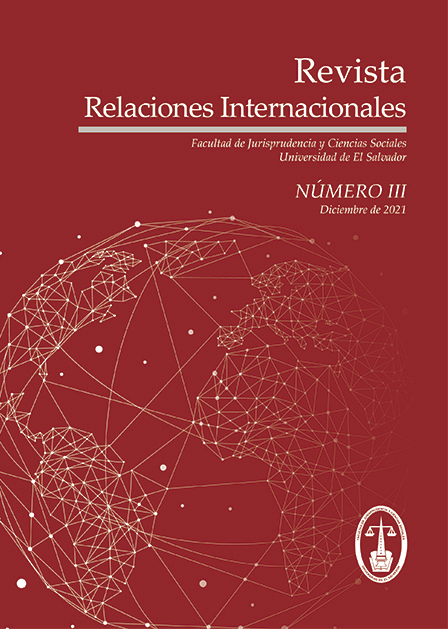Globalization and human mobility: job improvement
Keywords:
Migration, Globalization, Economy, Job improvement, Income increase, Neoclassic theoryAbstract
The article aims to study the causes of human mobility in today´s world, starting from leading cause, which is the search for the best job opportunities and increase their income abroad, as supported by the Neoclassic theory on migration. The questions to be answered are: What are the causes of migration? What have been its repercussions on the global society? The hypothesis formulated is regarding the general desire that the migrant has about improving the working conditions and the income. The study is based on the neoclassical theory on migration, where the main axis is that there are not only internal migrations, from rural to urban, but also from national to international, which have as their main cause job improvement and income increased. Subsequently, the topic is developed on migration, economy, and employment, where the causes of migration and what entails, such as how technological development in the receiving country and sending remittances to the country of origin. In the graph, there are six main reasons that experts consider the most common causes for migrations, highlighting job improvement. Then, subtopics about globalization and migration are developed, here is where both phenomena are linked, arguing that globalization has done a lot to increase migrations, since and with this, technology, social networks have been facilitated, relationships, and agreements between governments and the fact that people have to impulse to choose a region to migrate to, where to venture, always seeking their well-being.
Downloads
References
Cuevas, Daris, “La inmigración y la globalización”. Puntos de Vista. Listin Diario, 2017. Accedido el 19 de febrero de 2021, https://listindiario.com/puntos-de-vista/2017/07/20/474824/la-inmigracion-y-la-globalizacion.
De Haas, Hein. “Migration and Development: A Theoretical Perspective”, The International Migration Review, vol. 44, no. 1 (2010): 227–264. https://www.jstor.org/stable/20681751.
Farazmand, Ali. Global encyclopedia of public administration, public policy, and governance. New York, NY: Springer Berlin Heidelberg, 2018. DOI:10.1007/978-3-319-31816-5_4024-1.
Garrido Ferradanes, Fernando. “Globalización y Migración”. Revista de Ciencias Sociales. N° 6, Dpto. de Estructura Social, Universidad Complutense de Madrid (2004): 1-29. ISSN-e 1696-7348, http://www.apostadigital.com/revistav3/hemeroteca/garrido2.pdf
Harris, John R., and Michael P. Todaro. “Migration, Unemployment and Development: A Two-Sector Analysis.” The American Economic Review, vol. 60, no. 1, 1970, pp. 126–142. JSTOR, http://www.jstor.org/stable/1807860.
Introduction to Immigration Economics | Boundless Economics. Accedido 7 de julio de 2021. https://courses.lumenlearning.com/boundless-economics/chapter/introduction-to-immigration-economics/.
Lumen Boundless Economics. Introduction to Immigration Economics. Immigration Economics. Acceso el 21 de febrero de 2021, https://courses.lumenlearning.com/boundless-economics/chapter/introduction-to-immigration-economics/
Mitze Timo y Reinkowski Janina. Testing the Neoclassical Migration Model: Overall and Age-Group Specific Results for German Regions. Ruhr Economic Papers #226, ZAF 43 (2011): 277–297. https://doi.org/10.1007/s12651-010-0046-2
Organización Internacional para las Migraciones (OIM). Informe sobre las Migraciones en el Mundo. La gestión de la Movilidad Laboral en una Economía Mundial en plena Evolución. Vol. 4 (2008): 10, accedido 7 de julio de 2021, https://publications.iom.int/books/informe-sobre-las-migraciones-en-el-mundo-2008-la-gestion-de-la-movilidad-laboral-en-una
Ryder, Guy, y ILO Director-General. “World Employment and Social Outlook - Trends 2020”. World Employment and Social Outlook, 2020, 108. Acceso el 19 de febrero de 2021, https://www.ilo.org/global/about-the-ilo/newsroom/news/WCMS_734454/lang--en/index.htm
Statistics Noway. Immigrants by reason for immigration. 2020. Accedido el 21 de febrero fe 2021, https://www.ssb.no/en/innvgrunn/.
Taran, Patrick. Human Mobility: An Imperative for Development in the Age of Globalization: Presentation Session 1, Causes of Migration. Launch Seminar Osce-Ilo-Iom Handbook on Labour Migration, Mediterranean Edition Rabat, Morocco, International Labour Office, 2007. https://www.osce.org/files/f/documents/0/8/30008.pdf.
United Nations, Department of Economic and Social Affairs and Population. World Population Prospects 2019, Revision Highlights, 2019, https://population.un.org/wpp/Publications/Files/WPP2019_Highlights.pdf.
United Nations, Department of Economic and Social Affairs, Population Division, International Migration 2020, Highlights report, https://www.un.org/development/desa/pd/sites/www.un.org.development.desa.pd/files/undesa_pd_2020_international_migration_highlights.pdf
Downloads
Published
How to Cite
Issue
Section
License
Copyright (c) 2021 Revista Relaciones Internacionales

This work is licensed under a Creative Commons Attribution-NonCommercial 4.0 International License.
The authors transfer the copyright rights in favor of the Faculty of Jurisprudence and Social Sciences of the University of El Salvador (through Aequus Editorial) to include their writing in Revista Relaciones Internacionales.








